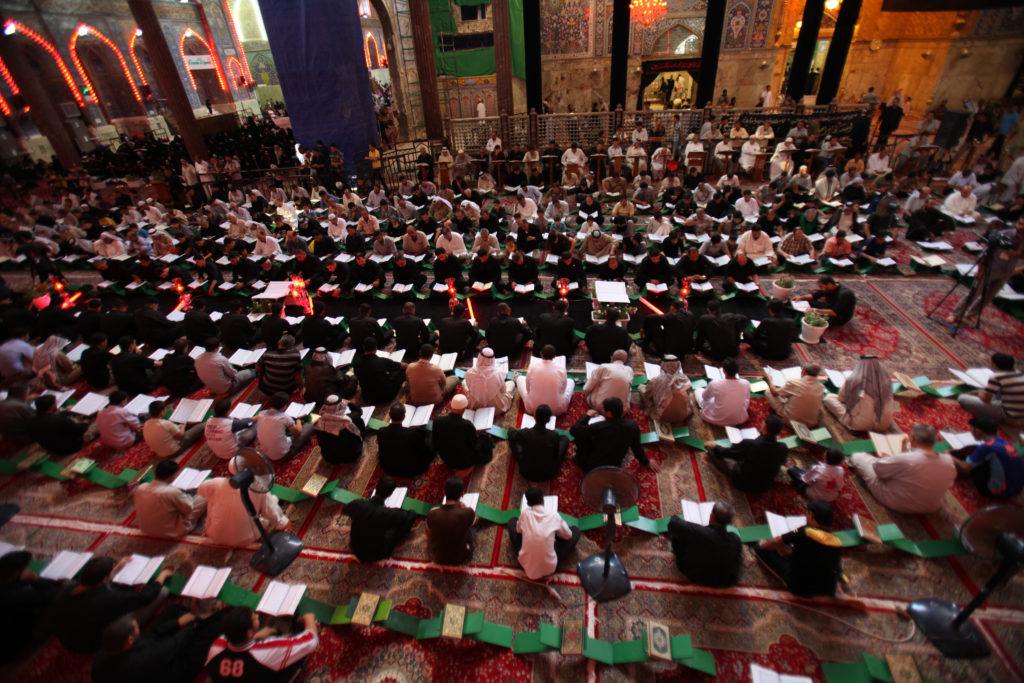This article was originally published in Spektrum Iran (3 – 2011), and is republished here with permission of the author.
There is only but one single truth. God, who is al-Ḥaqq, is at once the only Truth and the only Reality; there being none other. This divine unicity and cognitive unity calls forth in man a single-minded and wholehearted attachment to the Truth as such. This is as it should be. But God in His infinite perfections is essentially unfathomable. Being separated from Him, we can only know Him through His names, signs, and creations, which are apparently not “one” but rather multiple and multifarious. The multiplicity of the created order makes the single-minded attachment to the One Truth a difficult and somewhat perilous endeavor. To the degree that we become attached to any one particular sign or manifestation and lose sight of its essential identity with the Essence, and hence with all other manifestations, we are not giving God His due and are in reality trying to limit the non-delimited Totality. This truth applies to all things that are primarily connected with the divine and constitute the ways and means by which He is approached. Hence religion, when it is humanized and seen as an ideology that is on par with and in opposition to other religions, acts as an obstacle and barrier to the wholehearted worship of God immaculate—a worship that would constitute what the Qurʾan calls the “upright religion” that was brought by all prophets. [1]In many of his speeches, Imam Khumaynī (r) reminded his audience that if all of the prophets were to be gathered in one place and at one time, they would not have any conflict or discord with one another. See: http://www.hawzah.net/Hawzah/magazines/MagArt.aspx?MagazineNumberID=4334&id=28408
The sign which tells us that our hearts are no longer open to the infinite nature of the divine and which warns us that veils have entrapped them is complacency. When we are complacent and comfortable with our religion, being smug with the “fact” that we and only we are in possession of the “whole” truth, that is when the true worship of God ceases and the raison d’être of religion is no longer in place. Such complacency brings about a false sense of euphoria and happiness. The Qurʾan speaks of this happiness as a quality possessed by the mushrikūn in the following verses:
So set your heart on the religion as a people of pure faith, the origination of Allah according to which He originated mankind (There is no altering Allah’s creation; that is the upright religion, but most people do not know)—turning to Him in penitence, and be wary of Him, and maintain the prayer, and do not be among the polytheists—of those who split up their religion and became sects: each faction exulting in what it possessed.[2]Qurʾan, al-Rūm (30):30-32.
Sulṭān Muḥammad Gunābādī, a mystic of the 19th century, comments on this verse in his exegesis of the Qurʾan:
Know that on account of his human nature, man is predisposed to attachment and association. If he were to become aware, he would know that he has not achieved human perfections per se, and that which he has achieved is not his complete perfection; rather, there exist for him boundless “lost” perfections [of which he is presently deprived]. So, if he is in search of that which he has lost—the seeker being none other than the wayfarer journeying to God in all sincerity—then he will not be happy with that which is [presently] with himself, but rather, he will abhor it and will turn away from it. But he who is not in search of that which he has lost will become attached to nothing but that which he has achieved of superficial perfections such as sciences, beliefs, qualities, moral virtues, mystical disclosures, wealth, and children. It is in this way that “every faction exults in that which it possesses”; the street-sweeper exults in the perfection of his sweeping, the magician of his magic, the businessman of his business, the scholar of his knowledge, the worshiper of his worship, the ascetic of his asceticism, and the mystic of his mysticism.[3]Sulṭān Muḥammad Gunābādī, Tafsīr Bayān al-Saʿādah fī Maqāmāt al-ʿIbādah, vol. 3 (Beirut, 1988), p. 221.
Now this should not be taken to mean that the “superficial perfections” are not perfections, or that which a person has achieved and acquired of the truth is not the truth, so as to imply either the relativity of knowledge or the relativity of truth, and bring about a debilitating skepticism cum pluralism. Rather, what this quote is emphasizing is the limitation of knowledge that comes with the human state, and the truth that awareness of this limitation is quintessential to the spiritual life of the individual soul as well as the religion as a whole. For it is only when man comes to know that he does not know, that he acquires the necessary humility to turn to God in penitence.
The awareness of his ignorance with respect to reality and the Real allows him to be truly wary of God (ittaqūhu) and consequently to continuously aspire to maintain His remembrance by maintaining the prayer.
For it is only when man comes to know that he does not know, that he acquires the necessary humility to turn to God in penitence.
On the contrary, when man is oblivious to the limitations of his knowledge and claims to possess it in an absolute and exclusive sense—this is when he is making the relative to be the absolute and the limited to be the unlimited, and this is nothing other than shirk.
And most of them do not believe in Allah without doing shirk.[4]Qurʾan, Yūsuf (12):106.
When this is done in the case of religion, which is the way to God, it leads to sectarianism. In sectarianism, the madhāhib are absolutized to the extent that there remains no room for any other manifestation of God’s infinite Truth.
This does not mean that man cannot know and must remain oblivious of the possibility of deviation in any religion and the coming to the scene of heterodoxies and heresies—for error does exist and it can be recognized. Hence any error posing as a religion or a madhhab must be exposed. When any sect moves away from the guiding principles of the religion in which it is based, it becomes a heterodoxy and eventually a heresy. In the case of Islam, the essential and substantial principles of the Truth are succinctly expressed in the shahādatayn. Imam Jaʿfar al-Ṣādiq (ʿa) defines the Muḥammadan Islam and its canonical consequences in the following manner:
Islam is the testimony ‘there is no god but Allah’ and the affirmation of the Messenger of Allah (ṣ); because of it blood is spared, upon it marriages and inheritances take place; and on its apparentness the congregation of people [as an Ummah] transpires.[5]al-Kulaynī, al-Kāfī, vol. 2, p. 25.
This “simple” criterion of the shahādatayn is in fact extremely profound and full of wisdom. On the one hand, it reflects the breadth and horizontal scope that God wishes Islam to have, whereby anyone who even verbally consents to these truths is included in the fold of God’s infinite mercy and generosity. Allowing for this is to say that the limited understanding of any believer, no matter how weak, is still a truth and an instance of an understanding that is valid. For though it might be weak and low, because it is pointing to something higher and hence “open-ended”—and while it is not in conflict with the basic principles—it is an authentic representation of the truth and is spiritually efficacious.
On the other hand, the criterion of the shahādatayn reflects the great depth and the vertical infinitude of the truth of Islam and God. It is because tawḥīd, or God’s unicity, ultimately pertains to His Essence, which de facto cannot be fathomed, and because the inner substance of the Messenger of Allah (ṣ) is beyond the reach of lesser men, that the shahādatayn remind us of Divine Mystery and our limitations with regard to it. To rephrase, speculatively (theoria) the Divine Essence is unknowable and Its infinite words or signs are inexhaustible, and practically (praxis) the prophetic substance is superabundant and the sunnah of the Prophet (ṣ) cannot be practiced by imperfect men in its totality.
…speculatively (theoria) the Divine Essence is unknowable and Its infinite words or signs are inexhaustible, and practically (praxis) the prophetic substance is superabundant and the sunnah of the Prophet (ṣ) cannot be practiced by imperfect men in its totality.
To repeat, on the one hand, the limited truth is true in reality (it is not a construct and creation of the human mind as asserted by skeptics, relativists, and pluralists), and this leads to certainty on the cognitive plane and resolve on the volitional level. With regards to the madhhab that any believer might be following, it brings about a surety and determination that is characteristic of those that worship God. On the other hand, the limited truth is limited due to man’s limitation of knowledge, and upon introspection, he knows that he does not know the total Truth, and this leads to a sacred perplexity (taḥayyur) on the noetic plane and to humility on the plane of the will. Such an awareness ensures that the follower of a madhhab does not absolutize it and take it to be the Truth. But if he were to put humility aside and feign to own the “truth”, then the ingrained sectarianism that would ensue would initially set him at odds with other sects, but eventually it would put him in conflict with other followers of his own sect, as he would see their version or reading of the sect to be “wrong” precisely because it is against his own understanding and the one that he “possesses”.
The allure of this spirit of “possessing” the truth is so great that it is ubiquitously found in all religious movements—especially those that claim to be the defenders of the true doctrine. Such claims are more predominant among the ideologues, activists, and the politicians, as their predilection for the pole of action over contemplation, or for the level of the rational over the properly intellectual does not give them the necessary depth of understanding to have an awareness of the truth that is not in their possession (ladayhim) and that is principially with God (ʿind Allah). The recent claims of a government official in Iran, Esfandiar Rahim Mashaei, to the ascendancy of the “school of Iran” over the “school of Islam”, can be understood in this light, as can the outrageous statements of the Kuwaiti-born demagogue, Yāsir al-Ḥabīb, on one side, as well as the diatribe of Wahhabi pulpiteers, on the other.
On a positive note, there are in the ummah more balanced voices of greater intellectuality. The most recent of these is the historic fatwa of the Leader of the Islamic Republic of Iran, Āyatullāh al-ʿUẓmā al-Sayyid ʿAlī Khamenei, in which he decreed:
[Even] the deprecation of the notables of our Sunni brothers is forbidden (ḥarām), to say nothing of the denunciation of the wife of the Prophet (the blessings of Allah upon him and his progeny) so as to violate her honor—this is rather not even possible in respect of the wives of the prophets [in general] and especially in the case of their master, the Greatest Messenger (the blessings of Allah upon him and his progeny).[6]یحرم النیل من رموز إخواننا السنة فضلاً عن اتهام زوج النبي (صلّى الله عليه وآله) بما يخل بشرفها بل هذا الأمر ممتنع على نساء الأنبياء وخصوصاً سيدهم الرسول الأعظم (صلّى الله عليه وآله).
Now, those sectarians who are sincere in their defense of their limited version of truth bring forth from traditional sources proofs for their perspective. On one level, it is easy to respond to them by saying that they are only seeing one side of the story and are not giving due attention to other traditions which oppose and may even abrogate their own proofs. But this, though perhaps sufficient for some, would be a superficial response. For while it is true that such individuals are guilty of absolutizing the limited truth that is in their possession, the very existence of such traditions which allow them to do so is a matter that is open to questioning. Why do there exist narrations and traditions in the Shiʿi corpus that would be found offensive to Sunnis and vice versa? Is it the case that these traditions have simply been fabricated? Do they, as the sectarians would have us believe, allude to the fact that the other side is totally wrong and that there is only one sect that will be saved, all the others deserving only hellfire? Or can there be another explanation for these polemical traditions?

One possible explanation comes from the mystics of Islam. In their discussions on the beautiful names of Allah, they talk of two different realities which they refer to with the expressions, “the marriage of the names” and the “opposition of the names”.[7]تناكح بين السماء والتقابل الذي في الأسماء The latter phrase outlines the necessity of the opposition of certain names with others on the plane of manifestation. They stress the fact that this opposition here only highlights the greatness of the unity that prevails on the higher planes. To them the qualitative plenitude of God’s unicity directly implies His rich multiplicity, along with its apparent conflicts and differences.
It is in this light that there can be “necessary antagonisms” among the madhāhib; for in its attempt to fully manifest its idea and “name”, each madhhab seeks to forge an identity that is “separate” from the others.
…for in its attempt to fully manifest its idea and “name”, each madhhab seeks to forge an identity that is “separate” from the others.
The polemics that follow serve to maintain its integrity and allow for the madhhab to display its particular genius. Hence the existence of certain divisive traditions—usually based on historical details and facts—is perhaps the madhhab’s way of keeping the lowest of their adherents within the fold.
However, what kept these traditions from feeding the flames of rampant sectarianism in the past was the existence of higher levels of intellectuality and a living spirituality as embodied in the ʿulamāʾ and the saints of Islam. These accomplished souls made sure that the madhhab was firmly grounded in the doctrines and principles of Islam formally speaking, that it was in continuous communion with the Prophetic presence on the substantial level, and that it was open to spiritual wayfaring on the essential plane. Of course, those who could reach this last stage were few indeed, but it was they who used the full capacity of their intellect to see the unity that lies beyond the opposition and antagonism in the manifested order, and it is they who would then (re)turn to the people to enjoin them to work towards unity.
You suppose them to be a united body, but their hearts are disunited. That is because they are a lot who do not intellect.[8]Qurʾan, al-Ḥashr (59):14.
Unity is based upon the coming together of the hearts; disunity is their being dispersed. Disunity is a sign of an absence of true intellectuality. Imam ʿAlī (ʿa), who was the very embodiment of principled intellectuality after the Prophet (ṣ), wholeheartedly practiced the Qurʾanic imperative of unity and avoided creating disunity at all costs. Āyatullāh Jawādī Āmulī writes:
Ḥaḍrat Amīr al-Muʾminīn (ʿa) was foremost in not being tainted by any type of sectarianism nor sullied by any kind of internecine discord; his way was always in line with universal agreement [and general consent].[9]Jawādī Āmulī, The Expectation of Mankind from Religion, p. 127.
Hence, in a letter to Abū Mūsā al-Ashʿarī, Imam ʿAlī (ʿa) wrote:
There is not a man—heed this—more anxious to preserve the integrity and union of the ummah of Muḥammad (ṣ) than I. I seek for this [nothing but] a goodly reward and a noble end [with Allah].[10]Nahj al-Balāgah, sermon 78.
The Imam warned of the dangers of disunity in this way:
Beware of subjecting God’s religion to vagaries [and whims]. Indeed unity for the truth, though disliked by you, is better than divisiveness for a falsehood that you like; and indeed Allah, glory be to Him, has given no good to anyone on account of division and disunity—neither in the past nor in the future.[11]Nahj al-Balāgah, sermon 176.
Hence, when we give our own “color” (talawwun) to religion and limit it by forcing it to confine to the limits of our human imperfections and nafsānī predilections, we open the way to a false happiness or smugness with regards to the product of our caprice. We label this created sect and contrived faction with the word “religion”, not realizing that in doing so we effectively put an end to the true nature of religion and stifle its ability to act as an open-ended vehicle of transformation (an upaya, as the “upper” end of religion must necessarily involve the unlimited, infinite, and mysterious). This caricature of religion, being thus delimited and cut off vertically from its infinite source, the Real, is also cut off horizontally from other such caricatures, leading to contrariety and opposition with them.
Such division and divisiveness is liked by the lower soul as it is “happy” with its “own” creation and wishes for it to supersede all others.
But they fragmented their religion among themselves, each party exulting in what it had.[12]Qurʾan, al-Muʾminūn (23):53.
If on the other hand, we do not color the religion of Allah with our own hands, and we take what has come to us of the truth from Him—knowing it to be both the truth and limited—and use it to transcend ourselves by going beyond the lower caprice of our souls, though difficult and disliked by them, we will be able to see the limited truth in other divine dispensations and in other religious people. This subtle and sublime vision might enable us to unite with them for the sake of the higher Truth and His wish to be known in His infinite plenitude; but failing that, it must at the very least make us refrain from indulging in sectarianism that is the kiss of death of spirituality as such.
Notes
| 1. | ⇧ | In many of his speeches, Imam Khumaynī (r) reminded his audience that if all of the prophets were to be gathered in one place and at one time, they would not have any conflict or discord with one another. See: http://www.hawzah.net/Hawzah/magazines/MagArt.aspx?MagazineNumberID=4334&id=28408 |
| 2. | ⇧ | Qurʾan, al-Rūm (30):30-32. |
| 3. | ⇧ | Sulṭān Muḥammad Gunābādī, Tafsīr Bayān al-Saʿādah fī Maqāmāt al-ʿIbādah, vol. 3 (Beirut, 1988), p. 221. |
| 4. | ⇧ | Qurʾan, Yūsuf (12):106. |
| 5. | ⇧ | al-Kulaynī, al-Kāfī, vol. 2, p. 25. |
| 6. | ⇧ | یحرم النیل من رموز إخواننا السنة فضلاً عن اتهام زوج النبي (صلّى الله عليه وآله) بما يخل بشرفها بل هذا الأمر ممتنع على نساء الأنبياء وخصوصاً سيدهم الرسول الأعظم (صلّى الله عليه وآله). |
| 7. | ⇧ | تناكح بين السماء والتقابل الذي في الأسماء |
| 8. | ⇧ | Qurʾan, al-Ḥashr (59):14. |
| 9. | ⇧ | Jawādī Āmulī, The Expectation of Mankind from Religion, p. 127. |
| 10. | ⇧ | Nahj al-Balāgah, sermon 78. |
| 11. | ⇧ | Nahj al-Balāgah, sermon 176. |
| 12. | ⇧ | Qurʾan, al-Muʾminūn (23):53. |




 ً
ً








